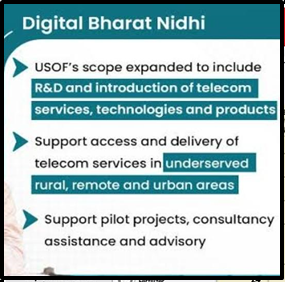TELECOMMUNICATIONS (ADMINISTRATION OF DIGITAL BHARAT NIDHI) RULES, 2024
Why in the News?
- New Rules Notified: The Department of Telecommunications (DoT) has notified the “Telecommunications (Administration of Digital Bharat Nidhi) Rules, 2024,” under the Telecommunications Act, 2023.
- Digital Bharat Nidhi Focus: These rules aim to enhance the management and implementation of the Digital Bharat Nidhi initiative to promote digital connectivity across India.
Source: PTI
Key Provisions and Objectives:
- Universal Service Fund: The Universal Service Obligation Fund (USOF) under the Indian Telegraph Act, 1885, has been restructured as Digital Bharat Nidhi, addressing new technological challenges.
- Criteria for Schemes and Projects: Aimed at provisioning telecom services in underserved areas, introducing next-gen technologies, supporting startups, and promoting sustainable technologies.
- Network Sharing: Networks established under DBN must be shared and made available on an open, non-discriminatory basis.
- Fund Allocation Process:
- Bidding: For promoting telecom services in underserved areas.
- Selection by Application: Supports R&D of new telecom technologies or services through co-funding and Viability Gap Funding (VGF).
Broader Implications and Vision:
- Government Commitment: Union Minister Jyotiraditya Scindia emphasized the government’s dedication to creating a digitally connected Atmanirbhar Bharat.
- Inclusive Development: The initiative will support sustainable and green telecom technologies, ensuring equal access to services for all societal segments.
About Digital Bharat Nidhi (DBN):
|




